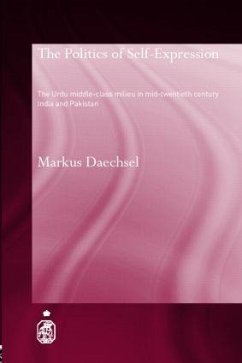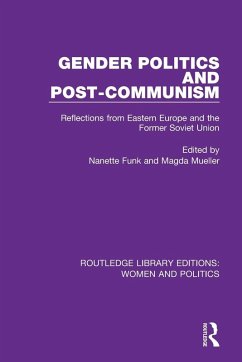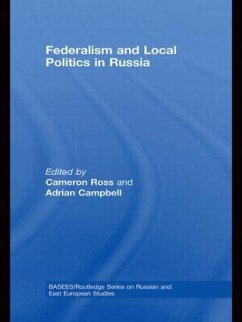Class Theory and History
Capitalism and Communism in the USSR
Versandkostenfrei!
Versandfertig in 1-2 Wochen
Weitere Ausgaben:

PAYBACK Punkte
94 °P sammeln!





First Published in 2002. Routledge is an imprint of Taylor & Francis, an informa company.
Stephen A. Resnick, Richard D. Wolff
Produktdetails
- Verlag: Routledge
- Seitenzahl: 368
- Erscheinungstermin: 19. Juli 2002
- Englisch
- Abmessung: 235mm x 157mm x 26mm
- Gewicht: 747g
- ISBN-13: 9780415933179
- ISBN-10: 041593317X
- Artikelnr.: 21002241
Herstellerkennzeichnung
Libri GmbH
Europaallee 1
36244 Bad Hersfeld
gpsr@libri.de
"A very ambitious and interesting book on a very important topic." -- Howard Sherman, author of Reinventing Marxism
"Using a version of Marx's theory of class to explain the rise and fall of the Soviet Union, and the Soviet Union as evidence for the validity of this theory, Resnick and Wolff succeed in providing us with an original and fascinating account of both. Whether one agrees or disagrees with their results, no future work on either of these important subjects will be able to ignore the sheer creative verve and intellectual rigor with which they lay out their arguments. Very highly recommended." -- Bertell Ollman, editor of Market Socialism: The Debate Among Socialists
"A stunning achievement!
"Using a version of Marx's theory of class to explain the rise and fall of the Soviet Union, and the Soviet Union as evidence for the validity of this theory, Resnick and Wolff succeed in providing us with an original and fascinating account of both. Whether one agrees or disagrees with their results, no future work on either of these important subjects will be able to ignore the sheer creative verve and intellectual rigor with which they lay out their arguments. Very highly recommended." -- Bertell Ollman, editor of Market Socialism: The Debate Among Socialists
"A stunning achievement!
Mehr anzeigen
Resnick and Wolff have extended their path breaking work in Knowledge and Class to a full-fledged class analysis of the rise and fall of the Soviet Union. Building on the clearest analysis of class in the Marxian tradition, Resnick and Wolff provide a comprehensive analysis of the core contradictions in pre-Soviet Russia and the Soviet Union. This is a work that all those concerned with the Soviet experience, the nature of class, and the possibilities of fundamental social change will have to contend with." -- Victor D. Lippit, editor of Radical Political Economy: Explorations in Alternative Economic Analysis
"Class Theory and History both follows in the best Marxian tradition's footsteps and develops new important insights. Building upon a notion of class whose pivot is the production and distribution of surplus, the authors offer a stimulating and original interpretation of the USSR's birth, development, and fall. This is class analysis at its best, a work which deserves the widest circulation." -- Guglielmo Carchedi author of For Another Europe: A Class Analysis of European Economic Integration
"Stephen Resnick and Richard Wolff, both economics professors, approach Soviet history on a highly theoretical level, analyzing the productive relations in Soviet society with sometimes mathematical (or, perhaps, pseudomathematical) precision...[A] strikingly original argument." -- Humanities and Social Sciences Online
"Class Theory and History both follows in the best Marxian tradition's footsteps and develops new important insights. Building upon a notion of class whose pivot is the production and distribution of surplus, the authors offer a stimulating and original interpretation of the USSR's birth, development, and fall. This is class analysis at its best, a work which deserves the widest circulation." -- Guglielmo Carchedi author of For Another Europe: A Class Analysis of European Economic Integration
"Stephen Resnick and Richard Wolff, both economics professors, approach Soviet history on a highly theoretical level, analyzing the productive relations in Soviet society with sometimes mathematical (or, perhaps, pseudomathematical) precision...[A] strikingly original argument." -- Humanities and Social Sciences Online
Schließen
Für dieses Produkt wurde noch keine Bewertung abgegeben. Wir würden uns sehr freuen, wenn du die erste Bewertung schreibst!
Eine Bewertung schreiben
Eine Bewertung schreiben
Andere Kunden interessierten sich für














